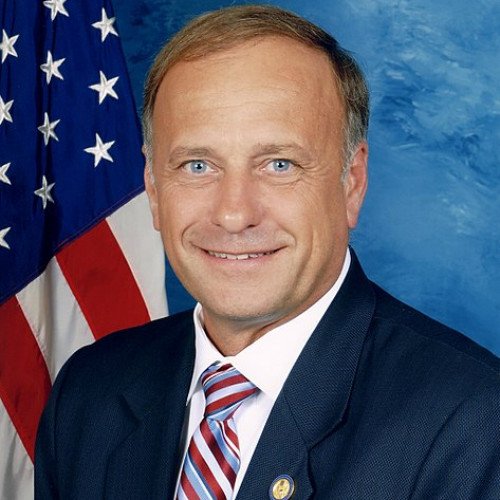Barry Goldwater VS Steve King

Barry Goldwater
Barry Morris Goldwater (January 2, 1909 – May 29, 1998) was an American politician, businessman, and author who was a five-term Senator from Arizona (1953–1965, 1969–1987) and the Republican Party nominee for president of the United States in 1964. Despite his loss of the 1964 presidential election in a landslide, Goldwater is the politician most often credited with having sparked the resurgence of the American conservative political movement in the 1960s. He also had a substantial impact on the libertarian movement.Goldwater rejected the legacy of the New Deal and, along with the conservative coalition, fought against the New Deal coalition. A member of the NAACP and active supporter of desegregation in Phoenix, Goldwater voted in favor of the Civil Rights Act of 1957 and the 24th Amendment to the U.S. Constitution, but opposed the Civil Rights Act of 1964, believing it to be an overreach by the federal government—a decision that considerably anguished him. In 1964, Goldwater mobilized a large conservative constituency to win the hard-fought Republican presidential primaries. Although raised as an Episcopalian, Goldwater was the first candidate of ethnically Jewish heritage to be nominated for President by a major American party (his father was Jewish). Goldwater's platform ultimately failed to gain the support of the electorate and he lost the 1964 presidential election to incumbent Democrat Lyndon B. Johnson by one of the largest margins in history. Goldwater returned to the Senate in 1969 and specialized in defense and foreign policy. As an elder statesman of the party, Goldwater successfully urged President Richard Nixon to resign in 1974 when evidence of a cover-up in the Watergate scandal became overwhelming and impeachment was imminent. Goldwater narrowly won re-election in 1980 for what would be his final and most influential term in the senate. In 1986, Goldwater oversaw passage of the Goldwater–Nichols Act, arguably his most significant legislative achievement, which strengthened civilian authority in the Department of Defense. The following year, he retired from the Senate and was succeeded by John McCain, who praised his predecessor as the man who "transformed the Republican Party from an Eastern elitist organization to the breeding ground for the election of Ronald Reagan". Goldwater strongly supported the 1980 presidential campaign of Reagan, who had become the standard-bearer of the conservative movement after his "A Time for Choosing" speech. Reagan reflected many of the principles of Goldwater's earlier run in his campaign. The Washington Post columnist George Will took note of this, writing: "We [...] who voted for him in 1964 believe he won, it just took 16 years to count the votes". Goldwater's views grew increasingly libertarian as he neared the end of his career. After leaving the Senate, Goldwater's views cemented as libertarian. He criticized the "moneymaking ventures by fellows like Pat Robertson and others [in the Republican Party] who are trying to... make a religious organization out of it." He lobbied for homosexuals to be able to serve openly in the military, opposed the Clinton administration's plan for health care reform, supported abortion rights, and the legalization of medicinal marijuana.
Statistics for this Xoptio

Steve King
Steven Arnold King (born May 28, 1949) is an American politician and former businessman who served as the U.S. Representative for Iowa's 4th congressional district from 2003 to 2021. A member of the Republican Party, he represented Iowa's 5th congressional district until redistricting. Born in 1949 in Storm Lake, Iowa, King attended Northwest Missouri State University from 1967 to 1970 but left without graduating. He founded a construction company in 1975 and worked in business and environmental study before seeking the Republican nomination for a seat in the Iowa Senate in 1996. He won the primary and the general election, and was reelected in 2000. In 2002 King was elected to the U.S. House of Representatives from Iowa's 5th congressional district after the incumbent, Tom Latham, was reassigned to the 4th district after redistricting. He was reelected four times before the 2010 United States Census removed the 5th district and placed King in the 4th, which he represented from 2013. King is an opponent of immigration and multiculturalism, and has a long history of racist and anti-immigrant rhetoric and white-nationalist affiliations. The Washington Post described King as "the Congressman most openly affiliated with white nationalism." King has been criticized for alleged affiliation with white supremacist ideas, and has made controversial statements against immigrants, and supported European right-wing populist and far-right politicians accused of racism and Islamophobia.For much of King's congressional tenure, Republican politicians and officials were silent about his rhetoric, and frequently sought his endorsement and campaigned with him because of his popularity with northwest Iowa's conservative voters. Shortly before the 2018 election, the National Republican Congressional Committee withdrew funding for King's reelection campaign and its chairman, Steve Stivers, condemned King's conduct, although Iowa's Republican senators and governor continued to endorse him. King was reelected, but after a January 2019 interview in which he questioned the negative connotations of the terms "white nationalist" and "white supremacy", he was widely condemned by both parties, the media and public figures, and the Republican Steering Committee removed him from all House committee assignments. King ran for reelection but, campaign funding and support having declined, lost the June 2020 Republican primary to Randy Feenstra.